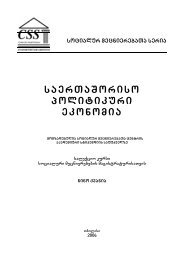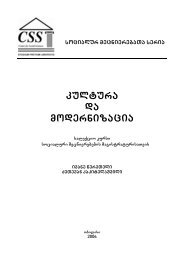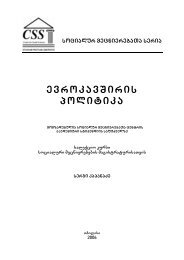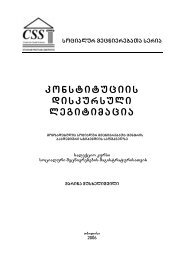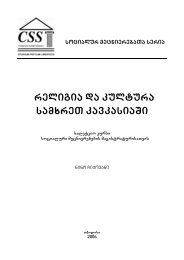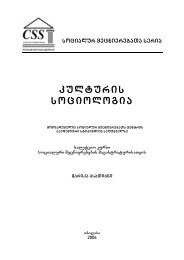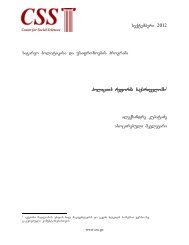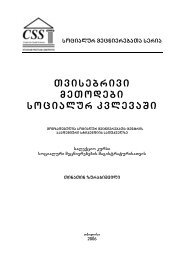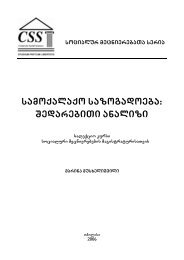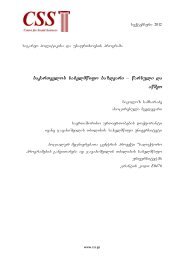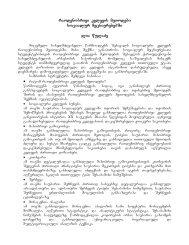Download
Download
Download
You also want an ePaper? Increase the reach of your titles
YUMPU automatically turns print PDFs into web optimized ePapers that Google loves.
Military Service in American<br />
Elections from Washington to McCain<br />
Prof. Jeremy Teigen<br />
Ramapo College
Strom Thurmond<br />
Bill Clinton
41 of 76 candidates<br />
vets<br />
Presumptions<br />
• Veterans appeal to<br />
voters<br />
• Veterans obtain more<br />
votes than<br />
nonveterans
Sometimes largely<br />
overrepresented<br />
(>75%!)<br />
Presumptions<br />
• Veterans appeal to<br />
voters<br />
• Veterans obtain more<br />
votes than<br />
nonveterans
Veterans largely over-<br />
represented in<br />
elections<br />
Yet, US founded on<br />
aversion to military,<br />
militarism<br />
Standing armies<br />
deeply political and<br />
symbolic concept to<br />
framers, 19 th century<br />
elites
Who has served<br />
and how?<br />
Does military<br />
service attract<br />
more votes?<br />
Yes or no: What are<br />
the reasons behind<br />
its appeal?
How do conflicts<br />
accord with vets in<br />
politics?<br />
How many vets would<br />
emerge if military had<br />
no connection?<br />
• In America’s two largest<br />
conflicts, 18 – 24% of<br />
males served.
Who has served<br />
and how?<br />
Does military<br />
service attract<br />
more votes?<br />
Yes or no: What are<br />
the reasons behind<br />
its appeal?
How to empirically<br />
test for a military<br />
biography effect in<br />
recent elections<br />
Reverse the<br />
“prediction”<br />
models, 1948-2008.
House elections<br />
provide<br />
• More cases, more<br />
work, shorter time<br />
span<br />
• Need to control for<br />
party, district,<br />
incumbency, gender,<br />
and race.<br />
• Bios hard to get
Who has served<br />
and how?<br />
Does military<br />
service attract<br />
more votes?<br />
Yes or no: What are<br />
the reasons behind<br />
its appeal?
Why nominate veterans at<br />
high rates if it does not<br />
necessarily help win?<br />
Six connections between<br />
military service and<br />
American presidential<br />
elections<br />
• Static ti<br />
appeals<br />
• Changes in American political<br />
development, wars
Bond between state<br />
and military<br />
Veterans unique in<br />
civic pantheon<br />
Central to state-<br />
building in US<br />
Easy cue for voter<br />
in complicated<br />
political arena
From mistrusted to<br />
entrusted: military<br />
as an institution<br />
Partisan hotbed to<br />
Professionalization<br />
Nominating<br />
evolution within<br />
parties<br />
Wars
Era Years Wars War is… Whig<br />
fears<br />
Party & Mil<br />
Ante-bellum & 1828-1864 1864 1812<br />
Local,<br />
High<br />
High Bond<br />
Bellum<br />
Indian low #<br />
Mex-Am<br />
Gilded Age 1868-1900 Civil Local,<br />
high #<br />
Low<br />
High bond<br />
Hiatus 1904-19481948 Span-Am<br />
Intl, low # None Low bond<br />
WWI<br />
Greatest<br />
Generation 1952-1996<br />
WWII<br />
Korea<br />
Intl, high # None No bond<br />
Vietnam &<br />
Post Cold War<br />
2000- VN, Iraq<br />
OIF<br />
Intl, low # None No bond
Era Years Party<br />
nominations<br />
Mil & State<br />
Mil good<br />
“cue”<br />
Vets<br />
Pressure<br />
Ante-bellum 1828- Congress,<br />
Bond Yes Low<br />
& Bellum 1864 Conventions<br />
Gilded Age 1868-<br />
1900<br />
Conventions Bond Yes High<br />
Hiatus 1904-<br />
Conventions Bond Yes Medium<br />
1948<br />
Greatest<br />
Generation 1952-<br />
1996<br />
Conventions,<br />
Primaries<br />
Bond Yes High<br />
Vietnam &<br />
Post Cold<br />
War<br />
2000- Primaries Bond Yes Low



